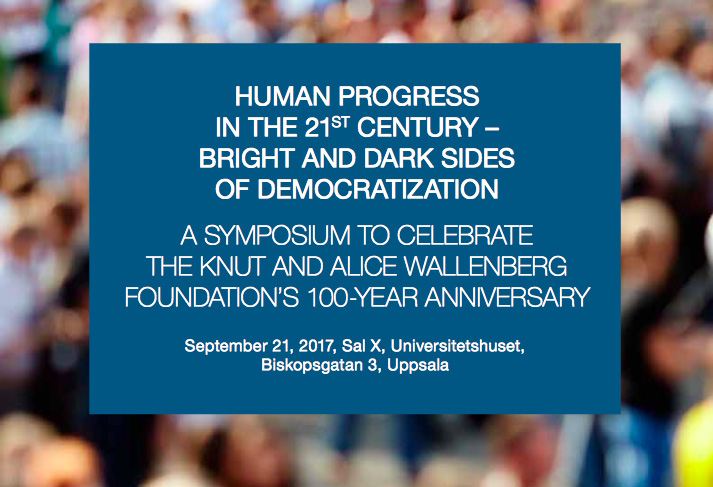Centenary symposium: Has the democratisation of the world come to a halt?

A number of years ago, a wave of democratisation swept the Arab world; today, in many countries, the situation is anything but democratic. In the West, growing populism is affecting confidence in democracy as a system. Is democracy in crisis, or is there a way forward?
The Knut and Alice Wallenberg Foundation – one of the largest private research funding bodies in Europe – is 100 years old this year. The centenary is being celebrated with six symposia on different themes and in different locations in Sweden. The symposium in Uppsala on 21 September – Human Progress in the 21st Century: Bright and Dark Sides of Democratisation – is the only one with a humanities/social sciences theme.
In recent years, research has shed light on important links between democratisation and global development, but has also revealed darker sides of democracy. The symposium will present and discuss the latest research in the area and will emphasise the importance of long-term basic peace and conflict research.
“Much can be learned by collecting large amounts of data and observing links,” says Professor Håvard Hegre of the Department of Peace and Conflict Research, one of the participants in the symposium. “During the symposium we will discuss the bright and dark sides of democratisation, challenges for civil society after a transition to democracy, and the relevance of research for continued development in the world.”
For several years now, Uppsala has had a conflict database that has been widely used around the world, and in Gothenburg the world’s largest democracy database, V-dem, shows that democracy has lost some ground in the past 10–15 years. Nonetheless, the world is considerably more democratic now than during the Cold War.
Symposium in Uppsala
The symposium will be introduced by Kerstin Sahlin, chair of the programme committee, and Eva Åkesson, Vice-Chancellor of Uppsala University. Opening addresses will also be given by Peter Wallenberg Jr and Göran Sandberg of the Knut and Alice Wallenberg Foundation, and Göran K. Hansson, Permanent Secretary of the Royal Swedish Academy of Sciences.
The keynote speaker is leading democracy researcher Donatella della Porta from the Scuola Normale Superiore, Italy. Participating Uppsala researchers include Patricia Mindus from the Department of Philosophy, Lisa Hultman, Peter Wallensteen and Håvard Hegre from the Department of Peace and Conflict Research, and Joakim Palme from the Department of Government. Jan Eliasson, former Deputy Secretary-General of the United Nations, will also participate.
The Knut and Alice Wallenberg Foundation supports free basic research of the highest international standard, primarily in medicine, technology and natural sciences, through long-term grants.
During its 100-year history, the Knut and Alice Wallenberg Foundation has granted SEK 24 billion to excellent Swedish research and education. Grants totalling SEK 1.7 billion per year in recent years have made the Foundation one of the largest private research funding bodies in Europe.
The Wallenberg Academy Fellows programme was established by the Knut and Alice Wallenberg Foundation in cooperation with five royal academies and sixteen Swedish universities. The universities nominate researchers to the programme, the academies assess the nominees and present their proposals to the Foundation, which makes the final selection. The universities then assume long-term responsibility for the activities of the selected researchers. The programme is designed to guarantee the selected researchers long-term resources to enable them to tackle difficult, long-term research issues. In the last five years, Uppsala University has had 23 Wallenberg Academy Fellows.


